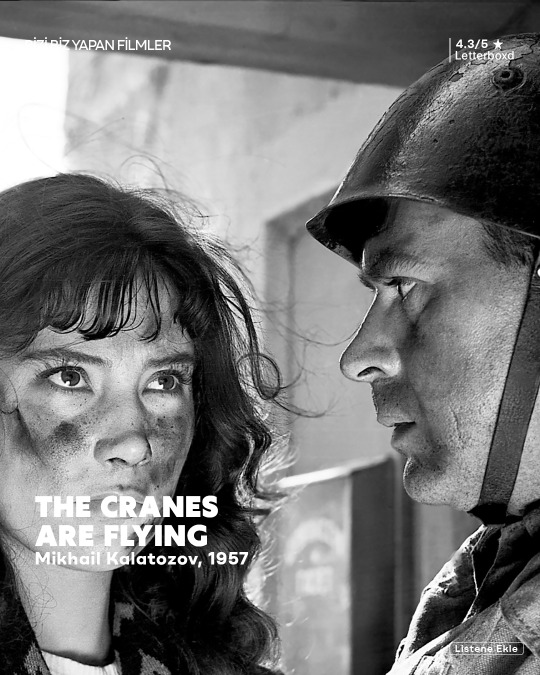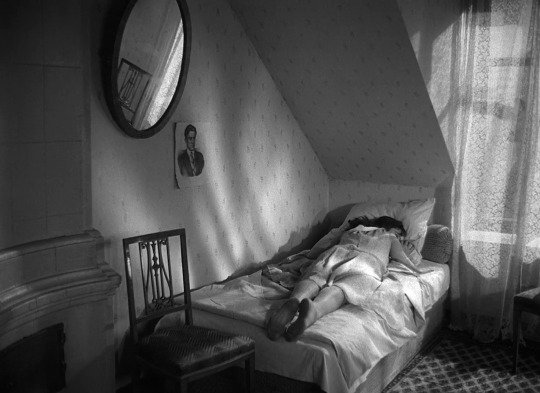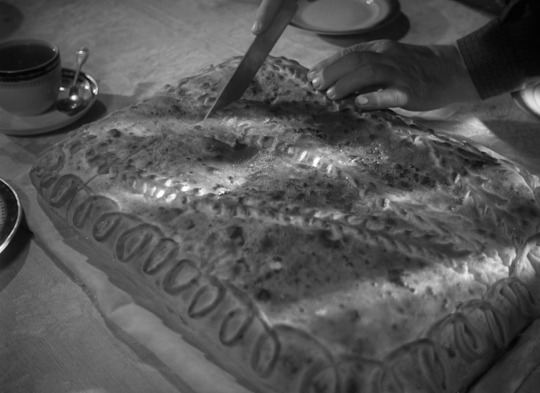#Aleksey Batalov
Explore tagged Tumblr posts
Text

#movies#polls#the cranes are flying#50s movies#mikhail kalatozov#tatyana samoylova#aleksey batalov#vasili merkuryev#aleksandr shvorin#svetlana kharitonova#have you seen this movie poll
35 notes
·
View notes
Text

モスクワは涙を信じない Cinema square Magazine No.2 シネマスクエアとうきゅう 監督=ウラジミール・メニショフ/出演=ヴェーラ・アレントワ、アレクセイ・バターロフ ほか
#MOSCOW DOES NOT BELIEVE IN TEARS#モスクワは涙を信じない#Cinema square Magazine#Cinema square#Vladimir Menshov#Vera Alentova#Aleksey Batalov#anamon#古本屋あなもん#あなもん#movie pamphlet#映画パンフレット
19 notes
·
View notes
Text







the lady with the dog (1960)
13 notes
·
View notes
Text
The Cranes are Flying (1958)
Immediately after our viewing of Soy Cuba, my viewing companion started reading about the director, Mikhail Kalatozov, and discovered that he had also previously directed Letyat zhuravli (The Cranes are Flying), and that it had won the Palme d’Or at Cannes in 1958. We checked to see if it was on the Criterion streaming service and discovered that it was, and immediately made plans to watch it as…

View On WordPress
#Aleksandr Shvorin#Aleksey Batalov#drama#mark boomer redmond#Mikhail Kalatozov#reviews#soviet russia#Tatiana Samoilova#the cranes are flying#Valentin Zubkov#Vasili Merkuryev#war
1 note
·
View note
Text

Aleksey Batalov as Sasha Rumyantsev in "The Rumyantsev Case" (1966)
103 notes
·
View notes
Text

1957 yapımı olan film, savaşın yıkıcı etkilerini ve insan ilişkilerinin karmaşıklığını anlatan bir drama olarak tanınır. Film, Mikhail Kalatozov'un yönetmenliğinde ve Tatyana Samoylova, Aleksey Batalov ve Vasili Merkuryev gibi ünlü Sovyet oyuncuların başrollerinde yer aldığı etkileyici bir yapıttır.
Filmin hikayesi II. Dünya Savaşı döneminde geçer ve ana karakter Veronika'nın yaşamını merkezine alır. Veronika, sevgilisi Boris'in savaşa gitmesinin ardından bir dizi zorlu deneyimle karşı karşıya kalır. Film, savaşın getirdiği acıları, kayıpları ve aşkın gücünü ele alırken, insanların içsel çatışmalarını ve hayatta kalma mücadelelerini gözler önüne serer. Film, ayrıca savaşın insanlar üzerindeki etkilerini gerçekçi bir şekilde tasvir etmesiyle dikkat çeker.
#cinephile#cinema#film#cinemetography#cult film#classic film#film kesitleri#film önerileri#sinema#movie#mikhail kalatozov#the cranes are flying#tatyana samoylova#alexey batalov#war movies#savaş filmleri#vasili merkuryev
3 notes
·
View notes
Text

CINE Moscú no cree en lágrimas (1980) Título original: Москва слезам не верит Unión Soviética (URSS) Dirección: Vladimir Menshov Idioma: Ruso con Subtítulos en Español
Atención: Solo para ver en PC o Notebook Para ver el Film pulsa o copia y pega el Link: https://memoriasdelcafe.blogspot.com/2025/04/moscu-no-cree-en-lagrimas-1980.html
Reparto: Vera Alentova, Aleksey Batalov, Irina Muravyova, Alexandr Fatiushin, Raisa Ryazanova, Natalya Vavilova
Género: Comedia dramática
SINOPSIS: Tres mujeres de diferentes edades emigran a Moscú en 1958 buscando trabajo y un amor. A lo largo de la película asistiremos a sus sueños y deseos, sus amores, sus desilusiones. Las tres amigas, Antonina, Liudmila y Katerina, llegaron a la gran ciudad en busca de estabilidad laboral y afectiva y, a pesar de las circunstancias a veces adversas, 20 años después no han podido erradicar la ilusión de alcanzar la anhelada felicidad.
Críticas: "Cine en estado puro" -Richard Schickel: Time
Posición en rankings FA: 37 Mejores películas rusas de todos los tiempos
Premios: 1980: Oscar: Mejor película de habla no inglesa 1980: Festival de Berlín: Sección oficial de largometrajes 1981: Premios Oscars. 1 premio.
Gracias por vuestra atención! Hasta el próximo Film!
Julio César Pisón Café Mientras Tanto
cine #film #Moscunocreeenlagrimas
cafemientrastanto #juliopison
RESEÑA EN EL CAFÉ
Moscú no cree en lágrimas es un drama soviético que transcurre entre 1958 y 1978, siguiendo las vidas de tres mujeres provincianas que migran a Moscú en busca de oportunidades. Dirigida por Vladimir Menshov, la película combina realismo emocional con una crítica social aguda, destacándose por su exploración de temas como la clase social, los roles de género y la resiliencia humana.
Análisis de Temas y Personajes La película se centra en Katya, Antonina y Lyudmila, cuyos destinos divergen: una se convierte en obrera, otra en científica y la tercera en ama de casa. A través de sus experiencias, Menshov examina las contradicciones de la sociedad soviética, donde la igualdad prometida choca con las realidades de la movilidad social y el machismo. Katya, protagonista principal, encarna la lucha por la independencia femenina, enfrentando desafíos como madre soltera y trabajadora en un entorno urbano hostil. Su relación con Gosha, un humilde trabajador, subraya las tensiones entre clases, cuestionando la utopía soviética.
Narrativa y Estilo La estructura bifronte de la película —dividida en dos épocas separadas por 20 años— permite observar la evolución de los personajes y la sociedad. Menshov emplea un estilo realista, con diálogos naturales y escenarios cotidianos, reforzado por la fotografía de Igor Slabnevich, que captura la dualidad entre la impersonalidad de Moscú y la calidez de los momentos íntimos. La banda sonora, con melodías melancólicas, complementa la exploración de pérdidas y esperanzas.
Recepción y Legado Aunque inicialmente enfrentó escepticismo por su tono crítico, el filme fue un éxito de taquilla en la URSS y ganó el Óscar a la Mejor Película Internacional en 1981, un hito durante la Guerra Fría. Su triunfo internacional abrió puertas para el cine soviético, destacando su capacidad para conectar emocionalmente más allá de las fronteras ideológicas. Hoy, es considerada una obra maestra del cine ruso, elogiada por su profundidad psicológica y relevancia atemporal.
Curiosidades sobre la Película
Título y Metáfora: El título alude a la indiferencia de Moscú ante las penas individuales, simbolizando la lucha por sobrevivir en un entorno urbano implacable.
Óscar Sorpresa: Fue la primera película soviética en ganar un Óscar desde 1969, superando favoritos como El tambor de hojalata (Alemania).
Casting Destacado: Vera Alentova, quien interpretó a Katya, era relativamente desconocida antes del filme. Su actuación la consagró como ícono cultural.
Escena Iconica: La secuencia en el metro donde Katya llora en silencio resume la soledad y fortaleza de su personaje.
Censura y Diálogos: El guion pasó por múltiples revisiones para cumplir con la censura soviética, aunque conservó su esencia crítica.
Secuela Moderna: En 2020, Menshov estrenó Moscow Still Doesn’t Believe in Tears, explorando los desafíos actuales de la Rusia postsoviética.
Documental Anexo: Menshov filmó Cómo se hizo "Moscú no cree en lágrimas", ofreciendo un vistazo al proceso creativo.
Impacto Cultural: La película influyó en debates sobre los roles femeninos en la URSS, destacando temas como la maternidad y la autonomía laboral.
Presupuesto Modesto: A pesar de su bajo costo, el filme logró una estética pulida y emotiva, demostrando que el realismo no requiere grandes recursos.
Reconocimiento Global: Fue aclamada en festivales de cine occidentales, facilitando un intercambio cultural inusual durante la Guerra Fría.
Moscú no cree en lágrimas no solo es un retrato conmovedor de la vida soviética, sino también un testimonio del poder del cine para trascender barreras políticas y emocionales. Su legado perdura como un estudio universal sobre la resiliencia y la búsqueda de identidad.
Gracias por vuestra atención! Hasta el próximo Film!
Julio César Pisón Café Mientras Tanto
0 notes
Text
'The Cranes are Flying' – love and death in wartime Russia on Max and Criterion Channel
Mikhail Kalatozov, most famous today for his daring cinematic essay I Am Cuba, was something of a throwback to the silent Soviet masters when he made his breakthrough film, The Cranes are Flying (Soviet Union, 1957). It’s the story of almond-eyed brunette beauty Veronica (Tatiana Samoilova) and idealistic architecture student Boris (Aleksei Batalov), who are in the throws of young love and…
#1957#Aleksandr Shvorin#Aleksei Batalov#Blu-ray#Criterion Channel#DVD#Max#Mikhail Kalatozov#Soviet Union#Tatiana Samoilova#The Cranes are Flying#VOD
0 notes
Text





The Cranes Are Flying (1952) | dir. Mikhail Kalatozov
#the cranes are flying#mikhail kalatozov#tatiana samoilova#aleksey batalov#films#movies#cinematography#screencaps
320 notes
·
View notes
Photo




Dama s sobachkoy (Iosif Kheifits, 1960)
#dama s sobachkoy#the lady with the dog#la dama del perrito#iosif kheifits#Дама с собачкой#iya savvina#aleksey batalov#1960#anton chejov#anton chekhov#soviet cinema#russian cinema
73 notes
·
View notes
Text

Moscow Does Not Believe in Tears (1980). This is a life story of three girlfriends from youth to autumn ages. Their dreams and wishes, love, disillusions. Different careers. And big late love.
There's a lot to like in this melancholy movie about three women trying to get by in Moscow, especially in the first half where the film operates as a sort of slice of life character study. Unfortunately, it falls apart in the second half. It ditches two of the women's narratives almost entirely and instead focuses on a 'love' story with a new, poorly drawn character that feels almost silly compared to the nuanced portrayals of other dynamics. It's a real bummer, especially as the first half feels pretty special. 7/10.
#moscow does not believe in tears#1980#Oscars 53#Nom: Foreign Film#Won: Foreign Film#Vladimir Menshov#Valentin Chernykh#vera alentova#aleksey batalov#irina muravyova#aleksandr fatyushin#raisa ryaznova#boris smorchkov#russia#russian#romance#class#coming of age#motherhood#7/10
11 notes
·
View notes
Photo










The Cranes Are Flying (1957)
#the cranes are flying#mikhail kalatozov#tatyana samoylova#aleksey batalov#vasili merkuryev#aleksandr shvorin#valentin zubkov#talks
68 notes
·
View notes
Photo

STRONTIUM 90
Acayipleşti havalar, bir güneş, bir yağmur, bir kar. Atom bombası denemelerinden diyorlar.
Stronsium 90 yağıyormuş ota, süte,ete umuda, hürriyete kapısını çaldığımız büyük hasrete.
Kendi kendimizle yarışmadayız, gülüm. Ya ölü yıldızlara hayatı götüreceğiz, Ya dünyamıza inecek ölüm.
Nâzım Hikmet, Bütün Şiirleri s.1632 “Strontium 90″ Fotoğraf: Mihail Kalatozov’un 1957 yapımı, “The Cranes Are Flying” (Leylekler Uçarken) filminden, (Tatyana Samoylova & Aleksey Batalov).
#nazım hikmet#bütün şiirleri#strontium#strontium 90#mihail kalatozov#Летят журавли#leylekler uçarken#letyat zhuravli#tatyana samoylova#tatiana yevgenyevna samoilova#aleksey vladimirovich batalov#aleksey batalov#corona#corona virüsü#corona 19#nazım#nâzım hikmet#nazım hikmet ran
46 notes
·
View notes
Photo









Moscow Does Not Believe in Tears (1980), dir. Vladimir Menshov
#moscow does not believe in tears#1980#vladimir menshov#vera alentova#aleksey batalov#natalya vavilova#soviet cinema#m*#f: mdnbit#d: vladimir menshov
80 notes
·
View notes
Photo










Moscow Does Not Believe in Tears (1980)
#moscow does not believe in tears#moskva slezam ne verit#vladimir menshov#aleksey batalov#natalya vavilova#movies#film#quotes#long post#1980
872 notes
·
View notes
Photo










LETYAT ZHURAVLI (Mikhail Kalatozov, 1957)
#letyat zhuravli#the cranes are flying#cuando pasan las cigueñas#mikhail kalatozov#tatyana samojlova#aleksey batalov#vasiliy merkurev#aleksandr shvorin#svetlana kharitonova#film#cine
25 notes
·
View notes